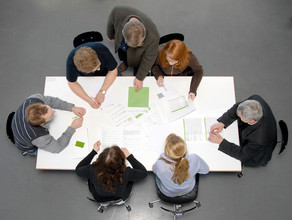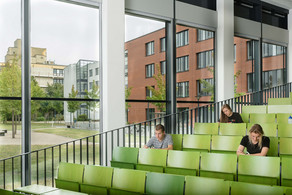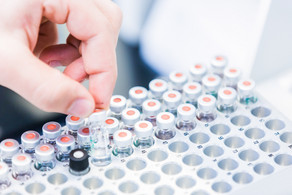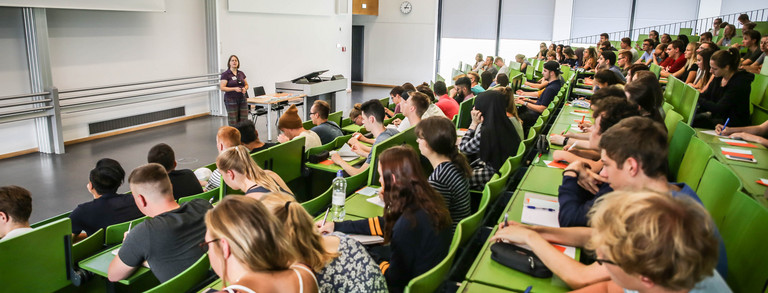Bachelor
Module: Introduction to Biochemical- and Chemical Engineering
Lecturer: Prof. Dr. Stephan Lütz and Prof. Dr.-Ing. Norbert Kockmann (Equipment Design)
Introductory course in biochemical- and chemical engineering with an outlook on the professional fields of activity. Building on school knowledge in physics, chemistry and mathematics, the solution of process engineering and biotechnological problems is demonstrated in an exemplary manner. Fundamentals of fermentation, enzyme and reaction engineering, and various separation processes are taught, as well as knowledge of process engineering equipment and microorganisms.
Registration information:
Module: Bioengineering II
Lecturer: Dr. Georg Hubmann
The lecture and exercise deal with the fundamentals of enzyme engineering and fermentation technology.
Registration information:
Master
Module: Bioprocess Engineering
Lecturer: Prof. Dr. Stephan Lütz
The lecture and exercise deal with the basics of bioprocess engineering. The students learn how the fermentation and enzyme technology methods learned in the module Bioengineering II (Bioreaction Technology) can be combined in a meaningful way to a biotechnological process by suitable work-up methods. Processes for separation, isolation, purification and packaging of bioproducts are presented and process examples are explained.
Registration information:
Module: Molecular Bioengineering I
Lecturer: Dr. Georg Hubmann
The lecture "Systems Biotechnology" deals with the understanding of microbial cells as factories for the production of natural products. The basics of cellular levels (genome, transcriptome and metabolome), the description of biological networks and methods for genome-wide systems analysis are covered. Subsequently, the course will cover in depth the fluxes of substances, substance transformations, stoichiometric networks, flux analyses and the creation of metabolic models.
Registration information:
Advanced courses
Module: Industrial Biotransformations and Bioprocesses
Lecturer: Prof. Dr. Stephan Lütz
The lecture deals with fundamentals, application aspects and case studies of enzymatic and microbial production of valuable and active substances in industrial processes. Students learn how basic effects of biochemistry and catalysis (inhibition, cofactor dependence) play out in processes and what technical implementation options are available. Case studies are presented and explained.
Module: Industrial Biotransformations and Bioprocesses
Lecturer: Prof. Dr. Stephan Lütz
The basics of enzymatic and microbial material transformations are deepened. In particular, computer-based experiments on fermentation, enzyme kinetics and biotransformation will be worked on. The influence of process parameters (e.g. stirrer speed, aeration) on the biotechnological process is illustrated. The execution on the PC allows the adjustment of the parameters in a wide range and the direct observation of the effect on the bioprocess.
Module: Advanced Bioprocess Engineering
Lecturer: del Amor Villa
Students will gain a deeper understanding of the many applications of biocatalysis outside of conventional aqueous media. Advantages offered by the application of novel reaction media such as ionic liquids, supercritical fluids, and organic solvents in engineering processes will be demonstrated. Application examples from industrial practice will be used to illustrate the current state of biocatalysis and the role these new reaction systems play in enabling more efficient processes with higher yields.
Module: Advanced Bioprocess Engineering
Lecturer: del Amor Villa
Students will gain a deeper understanding of the different methods of immobilization of enzymes and their use in technical processes. The starting point is first to look at the chemical/physical processes that form the basis for the different types of immobilization. With reference to the application of practically relevant biocatalysts, both the immobilization mechanisms and the variants of the immobilization processes are described in detail. In summary, the various influencing factors for the selection of immobilized or non-immobilized enzymes are elaborated and illustrated by means of application examples from industrial practice.
Module: Advanced Bioprocess Engineering
Lecturer: Hubmann
The lecture and exercises deal with the basics of statistical planning and analysis of complex data in the field of engineering. Students will learn relevant basics of statistics, descriptive analysis, analysis of variance with hypothesis testing, regression analysis, and an introduction to statistical modeling. Theory will be explained using appropriate examples in biotechnology and reinforced through independent exercises.
Module: Advanced Bioprocess Engineering
Lecturer: Karau
The course "White Biotechnology; Strain Optimization and Fermentation" covers industrial strain development and process development for bulk products. Biocatalysis will be discussed in more detail and then fermentation processes and their scale-up from a few mL to 100 m3 scale will be examined in more detail. Specifically, bio-process development, aspects of C-source selection, and white biotechnology will be addressed. Through an accompanying excursion, the practical relevance of the course content is conveyed in dialogue with the lecturer as well as the excursion leaders and possible future job profiles are presented.
Module: Sustainable Bio- and Chemical Engineering, studium oecologicum
Responsible: Prof. Dr. Stephan Lütz / Dr. Georg Hubmann
In this course, students first receive basic information on climate protection in an interdisciplinary lecture and an insight into the climate research of different disciplines as well as an overview of involved actors, consequences and risks of climate protection.
Module: Sustainable Bio- and Chemical Engineering, studium oecologicum
Responsible: Dr. Georg Hubmann
In the seminar they deal with the special challenges of climate change in bio- and chemical engineering. The students will independently develop, present and discuss the literature in accordance with the rules of scientific practice in front of the seminar group in dialogue with representatives from science and industry.
Internships and laboratories
BRT 01 - Characterization of a Saccharomyces cerevisiae fermentation in a stirred tank bioreactor with experimental determination of the oxygen transport coefficient
Within the scope of the practical experiment BRT 01, different alternatives for the recording and quantitative characterization of process characteristic quantities are to be shown - under guarantee of the sterility of the process - as well as their independent practical execution, including the interpretation of obtained measured values, is to be practiced. The experimental determination of the oxygen transport coefficient will be carried out using the BioProcessTrainer software and will serve as an example for a virtual practical course.
BRT 02 - Enzymatic triglyceride hydrolysis
In this practical course, first insights into the enzyme-catalyzed conversion of edible oils will be gained.
Responsible: Head of practical course BCI
Students will learn essential aspects of enzyme extraction and purification. Laboratory experiments (cell disruption, extraction and chromatography) will provide practical and further theoretical knowledge related to the lecture Bioprocess Engineering.
The module supplements the courses offered on the subject area of bio- and chemical engineering with practical or theoretical work from a limited sub-area of a research project in a subject of the Faculty of Bio- and Chemical Engineering chosen according to the students' inclination. The in-depth practical course can be carried out in bioprocess engineering. It gives the students an insight into experimental and theoretical working methods of bioprocess engineering. The results of the work are to be summarized in writing. You will receive 3 LP.
If you would like to do an in-depth internship in bioprocess technology, please contact us via e-mail.







